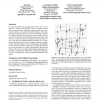Free Online Productivity Tools
i2Speak
i2Symbol
i2OCR
iTex2Img
iWeb2Print
iWeb2Shot
i2Type
iPdf2Split
iPdf2Merge
i2Bopomofo
i2Arabic
i2Style
i2Image
i2PDF
iLatex2Rtf
Sci2ools
154
click to vote
IPSN
2007
Springer
2007
Springer
Sparse data aggregation in sensor networks
We study the problem of aggregating data from a sparse set of nodes in a wireless sensor network. This is a common situation when a sensor network is deployed to detect relatively rare events. In such situations, each node that should participate in the aggregation knows this fact based on its own sensor readings, but there is no global knowledge in the network of where all these interesting nodes are located. Instead of blindly querying all nodes in the network, we show how the interesting nodes can autonomously discover each other in a distributed fashion and form an ad hoc aggregation structure that can be used to compute cumulants, moments, or other statistical summaries. Key to our approach is the capability for two nodes that wish to communicate at roughly the same time to discover each other at a cost that is proportional to their network distance. We show how to build nearly optimal aggregation structures that can further deal with network volatility and compensate for the los...
Related Content
| Added | 08 Jun 2010 |
| Updated | 08 Jun 2010 |
| Type | Conference |
| Year | 2007 |
| Where | IPSN |
| Authors | Jie Gao, Leonidas J. Guibas, Nikola Milosavljevic, John Hershberger |
Comments (0)

